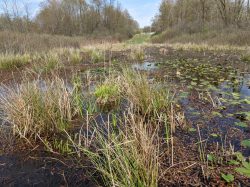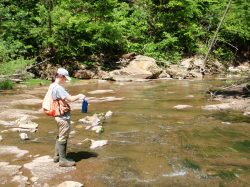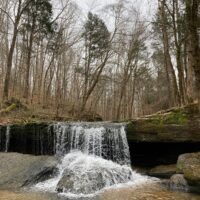By EnviroScience Senior Ecologist Michael Liptak, Ph.D.
In its recent 9-0 ruling on May 25, 2023, the Supreme Court of the United States (SCOTUS) drastically curtailed federal protection of wetlands (and likely ephemeral streams) under the Clean Water Act in Sackett v. EPA. The Sackett family wanted to develop a residential lot near Priest Lake, Idaho, which drains into a recognized Water of the U.S. (WOTUS). This involved placing fill into wetlands on the property. The U.S. Environmental Protection Agency (USEPA) stated that the wetlands on the Sackett property were connected to Priest Lake by a stream or ditch and were thus a WOTUS under federal jurisdiction. The Sacketts disagreed and sued.
 SCOTUS reversed their previous decision in Rapanos v. United States (2006) and held that the only wetlands under federal jurisdiction are those with a continuous surface connection with a recognized WOTUS, where it is impossible to distinguish where the federally regulated water body ends and the wetland begins. This essentially returns Clean Water Act protection to its status in the United States v. Riverside Bayview decision of 1985. The four opinions that were issued showed a division in the Court over how far to limit the definition of Waters of the U.S., with Justices Kavanaugh, Kagan, Sotomayor, and Jackson disagreeing with the exclusion of adjacent wetlands that are not physically touching waters of the United States, and Justice Thomas arguing that federal jurisdiction should be further limited to a traditional understanding of the term “navigable.”
SCOTUS reversed their previous decision in Rapanos v. United States (2006) and held that the only wetlands under federal jurisdiction are those with a continuous surface connection with a recognized WOTUS, where it is impossible to distinguish where the federally regulated water body ends and the wetland begins. This essentially returns Clean Water Act protection to its status in the United States v. Riverside Bayview decision of 1985. The four opinions that were issued showed a division in the Court over how far to limit the definition of Waters of the U.S., with Justices Kavanaugh, Kagan, Sotomayor, and Jackson disagreeing with the exclusion of adjacent wetlands that are not physically touching waters of the United States, and Justice Thomas arguing that federal jurisdiction should be further limited to a traditional understanding of the term “navigable.”
It is important to note that the Sackett decision did not change the federal definition of wetlands or remove the need for wetland delineations on properties. It is still important to understand the location of these resources on your property. This ruling shifts the responsibility for some wetland protection and permitting to the individual states. States such as Ohio and North Carolina, which have robust wetland protection and permitting, will likely see an increase in the number of permits processed. This may actually result in wetland mitigation being required for smaller impacts that would have been allowed under the federal permitting process.
Although this ruling did not address ephemeral streams directly, it is widely anticipated that they will also be excluded from federal regulation under the Clean Water Act.
On May 26, 2023, the USEPA and U.S. Army Corps of Engineers (USACE) released this statement “The U.S. Environmental Protection Agency and U.S. Army Corps of Engineers (the agencies) are in receipt of the U.S. Supreme Court’s May 25, 2023 decision in the case of Sackett v. Environmental Protection Agency. In light of this decision, the agencies will interpret the phrase “waters of the United States” consistent with the Supreme Court’s decision in Sackett. The agencies continue to review the decision to determine next steps.”

EnviroScience biologists and permitting specialists are well-versed in the navigation of confusing rules and regulations. Our team of environmental experts diligently acquaint themselves with these ever-changing complex issues, ensuring their knowledge remains both current and comprehensive. EnviroScience will provide pertinent updates as the USEPA and the USACE release guidance on how they will implement the Sackett ruling.
Before breaking ground on your next project, protect your efforts and the environment by entrusting EnviroScience to help you make sure you are in compliance with environmental regulations and requirements. Contact us today at 800.940.4025 for help with your project.
More information about this ruling can be found in this article by JD Supra and the SCOTUSblog.
Few environmental firms in the country retain EnviroScience’s degree of scientific know-how, talent, and capability under one roof. The diverse backgrounds of our biologists, environmental engineers, scientists, and divers enable us to provide comprehensive in-house services and an integrated approach to solving environmental challenges—saving clients time, reducing costs, and ensuring high-quality results.
Our client guarantee is to provide “Excellence in Any Environment,” meaning no matter what we do, we will deliver on our Core Values of respect, client advocacy, quality work, accountability, teamwork, and safety. EnviroScience was created with the concept that we could solve complex problems by empowering great people. This concept still holds true today as our scientists explore the latest environmental legislation and regulations and incorporate the most up-to-date technology to gather and report data.
EnviroScience expertise includes but is not limited to aquatic surveys (including macroinvertebrate surveys and biological assessments); ecological restoration; ecological services (including impact assessments, invasive species control, and water quality monitoring); emergency response; engineering and compliance services; endangered mussel surveys; laboratory and analysis; stormwater management; threatened and endangered species; and wetlands and streams (including delineation and mitigation). Further, EnviroScience is one of the few biological firms in the country that is a general member of the Association of Diving Contractors International (ADCI) and offers full-service commercial diving services.



